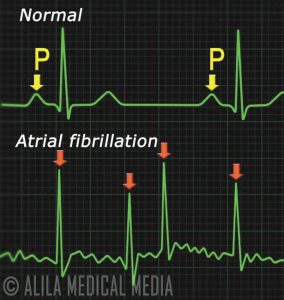By Dr. Aneley Yegezu Hundae, M.D., FACC


The two sides of the heart work in opposition to each other. The right side of the heart takes in deoxygenated blood from the body and feeds them to the lungs; the left side carries the oxygen and nutrient-rich blood from the lungs and feeds it back to to body. Four chambers make up the heart. The top chambers are called the atria, and the lower are the ventricles. In atrial fibrillation, the two atria quiver instead of pumping. Without proper functioning, the heart will begin to cause adverse effects very quickly.
Most of us are very familiar with symptoms of coronary heart disease, but Afib symptoms often go overlooked and are not taken as seriously as they should be. Atrial Fibrillation takes over 130,000 lives each year.
The symptoms of an atrial heart arrhythmia are:
• Dizziness
• Shortness of breath
• Racing heart
• Fluttering heart
• Palpitation
• Uneven heartbeat
• Chest pain
If left untreated, Afib can cause blood clots to form in the heart. These clots are produced due to the restricted pumping of the chambers, which causes the blood to pool in the atria and form clots. If the blood clots break off, they can reach the brain and cause a stroke. Patients with AFIB are seven times more likely to have a stroke than those with normal heart rhythm.
Risk factors for Afib include:
• Advancing age
• High blood pressure
• Obesity
• Obstructive sleep apnea
• European ancestry
• Diabetes
• Heart failure
• Ischemic heart disease
• Valvular heart disease
• Hyperthyroidism
• Chronic kidney disease
• Heavy alcohol use
• Enlargement of the chambers on the left side of the heart
Treatment for Afib
• Medications to regulate the heart’s rhythm (antiarrhythmic drugs, calcium channel blockers, beta blockers)
• Blood thinners to reduce the risk of stroke (Anticoagulants)
• Procedures (i.e. Catheter ablation, electrical cardioversion, implanted pacemaker, left atrial appendage closure, Watchman Device)
• Surgery (MAZE surgery creates scar tissue is created to block the abnormal electrical impulses)
It’s critical to seek medical attention from a respected cardiologist if you are experiencing any of the symptoms related to atrial fibrillation. DO NOT wait, the heart muscle, rhythm, rate, and ability to pump correctly, is what is keeping you alive.
Dr. Aneley Yegezu Hundae, M.D., FACC invasive cardiology and advanced heart failure management Dr. Hundae received his Premedical and Doctor of Medicine Degree from Jimma University School of Medicine. He completed his Internal medicine Residency at Mercer University School of Medicine. His Heart Failure/Heart Transplant fellowship at the University of Miami Cardiovascular Fellowship Program. Cardiovascular fellowship at Baylor University Medical Center.
Board certifications
• Cardiology
• Advanced Heart Failure and Transplant
• Nuclear Cardiology
• Comprehensive Echocardiography
• Internal Medicine
Port Charlotte Cardiology
3161 Harbor Blvd, Suite A, Port Charlotte, FL 33952
(941) 235-8892
www.portcharlottecardiology.com
 Southwest Florida's Health and Wellness Magazine Health and Wellness Articles
Southwest Florida's Health and Wellness Magazine Health and Wellness Articles

